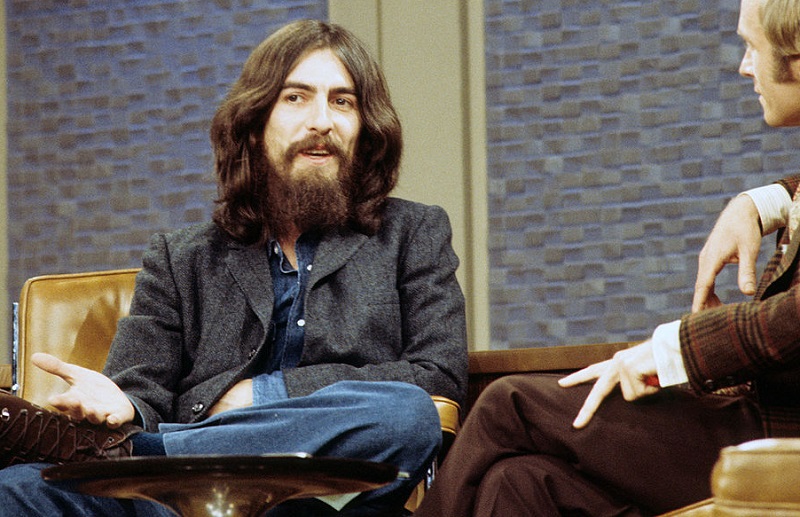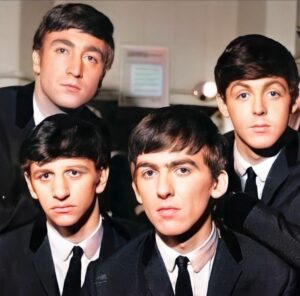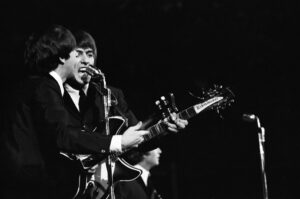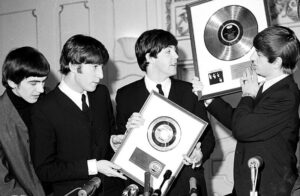We’re dipping into the Far Out Magazine vault to bring you a very special performance from The Beatles’ own George Harrison performing his classic song ‘Here Comes The Sun’ at the Concert For Bangladesh back in 1971.
At the time, the state of East Pakistan was in turmoil as it sought independence to become the nation of Bangladesh during the Liberation War. It was a conflict that the world was largely unaware of until George Harrison made it a global talking point.
The former Beatles man learned about the issue over dinner from his close friend and future sitar instructor, Ravi Shankar, who initially was planning to raise $25,000 dollars to help the Bangladeshi cause. But after getting Harrison on his side, his modest plans quickly grew into something rather extraordinary and a moment in musical history was created.
The two artists very specially curated Concert For Bangladesh shows on August 1st, 1971, the concerts would go on and set a precedent for benefit gigs forevermore, lighting the way for Live Aid and Farm Aid plus many more. The star-studded day would see the likes of Bob Dylan, Billy Preston, Eric Clapton, Badfinger and Ringo Starr all take to the stage to unite for a cause bigger than themselves.
Harrison had hoped to make the event the first performance from the full Beatles line-up since 1966 in America but it wasn’t to be. In the end, only Ringo arrived at the show providing a little help for his friend. John Lennon had verbally agreed to perform and even consented to Harrison’s stipulation that Lennon’s wife Yoko Ono could not perform with him.
Just a few days before the event, Lennon left New York City in a cloud of contempt as he and Ono fell out over Lennon’s agreement with his former bandmate.
Paul McCartney didn’t even contemplate the reunion for a moment as, according to speculation at the time, he thought it was silly to get back together so soon after the four split up, saying: “George came up and asked if I wanted to play Bangladesh and I thought, blimey, what’s the point? We’re just broken up and we’re joining up again? It just seemed a bit crazy.”
However, Harrison didn’t need to rely on Lennon and McCartney to steal the show as this beautiful stripped back version of ‘Here Comes The Sun’ from the performance shows. Harrison quietly asks the crowd, “Do you want me to try one with just these acoustic guitars? When we get the microphone on”—before bursting into perhaps the most blissful chord progression in musical history.
The song arrived as a piece of improvisation after avoiding his duties as a Beatle, “‘Here Comes the Sun’ was written at the time when Apple was getting like school, where we had to go and be businessmen: ‘Sign this’ and ‘sign that.’ Anyway, it seems as if winter in England goes on forever, by the time spring comes you really deserve it. So one day I decided I was going to sag off Apple and I went over to Eric Clapton’s house. The relief of not having to go see all those dopey accountants was wonderful, and I walked around the garden with one of Eric’s acoustic guitars and wrote ‘Here Comes the Sun.’”
The pair of concerts would go on to raise nearly $250,000 which was given to UNICEF to administer as they saw fit. Though by 1985 the Los Angeles Times reported that the final figure from books, CDs etc. amounted to nearly $12 million dollars being sent to help with the Bangladeshi people. Sadly, much of the money was tied up in an Internal Revenue Service escrow account for over a decade as the organisers had not applied for tax-free status on the money.
The concert and its recording is still to this day amassing money for the George Harrison Fund for UNICEF. The triple album release that immediately followed the event in the seventies hit No.1 in the UK and No.2 in the US and received the Grammy award for Album of the Year.



